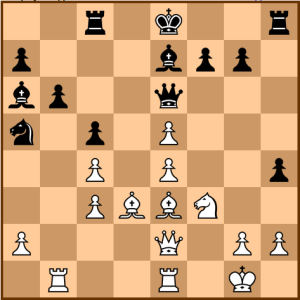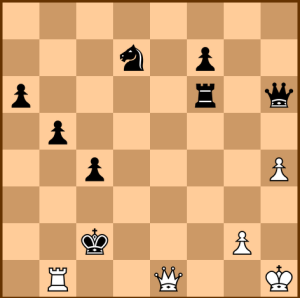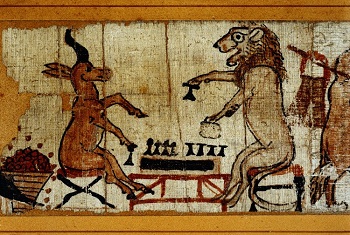You’ve just arrived at your board and look up at who you hope to be your next victim only to find that it’s a Grandmaster. Do you A) freak out with fear and start to sweat or do you B) feel no pressure and think you have nothing to lose? Many chess players, whether they are amateur or professional, get nervous. It’s an unfortunate aspect of chess; when it’s not just pure calculation but psychology comes into play even before you sit down at the board. I’m not a very strong player (current ECF 170 this was written a few months ago I’m currently 195 Jan 2013) but I live in a household where everyone plays chess.
Currently IM Thomas Rendle and my fiancé GM Gawain Jones spar with each other almost every free moment. Chess is a constant topic in the household with frequent mentions of various chess related topics. Gawain, being a professional is in a strange situation where chess is his job and also his hobby. You wouldn’t believe the amount of times I say to Gawain “You won that!??!?!??!?!??! Errr… How??”. Or how many times he tells me after a game his opponent avoided their pet line because “He thought I would know more theory than him so he played something he didn’t know” – What? How could you play something that you don’t know against someone who should know a little about everything (at least better than you would)? For example, Gawain and I have played a few times in weekenders (normally in Ireland or New Zealand where there aren’t many players in a Swiss Open), and most of the time it’s a friendly ‘I don’t want to make my girlfriend mad’ kind of draw. Even though he’s my coach and someone who definitely knows all my chess knowledge and skills, I have to play what I know when I play him otherwise I get into a situation where I am consuming too much time trying to find theory that I just don’t know. It is of course possible to work out things at the board but why would you put yourself already at a disadvantage before the game has started.
If you can prepare, that is always a good thing to do. It’s tough when you have double round days or hectic weekenders but you should be able to find the time if you are playing a long tournament. When checking your opponent’s game, you need to see what kind of player they are and play against their weaknesses. There are some players who refuse to go into an IQP (Isolated Queen’s Pawn) position and will avoid it at all cost. This means that they will weaken their position just so they don’t have to play with an isolated pawn! Anything unfamiliar for a player means that they’ll have to think more and spend more time analysing the position.
Pre Game:
Don’t lose the game before it’s started. You need to think you can do it!
Play your own openings.
Calm yourself down, if you freak out it’s only going to be problematic for you.
Prepare if you can.
Now the actual game is happening and you feel like you know your lines and you’re feeling quite confident but then all of the sudden you blunder. The blundering is something everyone experiences and it’s not something I know how to ‘fix’. For me, when I blunder, I know either I’m short of time (in which case I need to play faster) or I’m not concentrating and therefore need to focus more. Your mind is a funny thing especially when you are calculating and it can be your best friend or your worst enemy. A question that is often asked by players is how should I play against a stronger player? Should I just sit there and wait or should I mix it up? I would personally prefer to mix up the situation and get them thinking. Sometimes you may play seemingly normal moves that lose but you need to realize you need to play actively with your pieces.
Look at the position below, a fight between two GMs where the stronger of the two played as he calls it “regular moves”. However these moves didn’t achieve anything, especially in such a position from a Samisch Variation of the Nimzo Indian Defence, where white allows positional concessions in order to take the initiative. Ivan Sokolov vs. Darryl K Johansen 1. d4 Nf6 2. c4 e6 3. Nc3 Bb4 4. e3 b6 5. Nge2 Ne4 6. f3 Nxc3 7. bxc3 Be7 8. e4 Nc6 9. Ng3 Ba6 10. Bd3 Na5 11. Qe2 d6 12. O-O Qd7 13. Rb1 h5 14. Re1 14… h4 15. Nf1 c5 16. Be3 Rc8 17. Nd2 e5 18. f4 Bf6 19. dxe5 dxe5 20. Nf3 Qe6 21. fxe5 Be7

After 21…Be7! Black’s position is pretty horrible. As Sokolov writes: “Looking at my horrible pawn structure and slowly becoming aware of the long and difficult defence that lay ahead, I could not help but wonder about the speed of my positional collapse: in a mere 20 moves, playing White against an opponent I had never heard of and not having made any clear mistake – except that my whole concept was a positional blunder. 22. Rf1 Bxc4 23. Bg5 Bxd3 24. Qxd3 Nc6 25. Bxe7 Qxe7 26. Rbd1 O-O 27. Qd7 Qxd7 28. Rxd7 h3 29. gxh3 Rce8 30. Kg2 Nxe5 31. Rxa7 Nc4 32. Rf2 Rxe4 33. Ng5 Re5 34. Nxf7 Ne3+ 35. Kg3 Rf5 36. Re2 Nf1+ 37. Kg2 R8xf7 38. Rxf7 Kxf7 39. Kg1 Kf6 40. Kg2 b5 41. Kg1 c4 42. Kg2 Kg5 43. Kg1 Kh4 44. Kg2 Rf4 45. a3 g6 0-1
Endgame Technique Most players don’t often brush up on their endgame technique and I think this is probably the easiest place for players to score points. Mark Dvoretsky’s Endgame Manual is a tough read but will definitely improve your strength. Endings can feel dry but it’s amazing the mistakes you see when people play out an endgame. We don’t often have adjournments anymore and it’s sad that a lot of the beautiful subtleties of endgames have disappeared. Most people now dread the struggle of the endgame – and for good reason too, as one mistake could prove fatal. If you don’t know what you are doing you’ll definitely be more on the losing side
Question for the readers: How confidently can you checkmate with Bishop and Knight? You may think it’ll never come up and, while it rarely does, if you don’t know the idea you’ll be chasing your opponent’s king round and round in circles! If something like Dvoretsky’s Endgame Manual is a bit dry for you, try out Jesus De La Villa’s 100 Endgames You Should Know. It’s laid out in an easy to read format with good annotations. Grandmaster Rating A Grandmaster’s rating automatically boosts their number of wins – obviously they are good players. But players often play worse against Grandmasters than they would playing someone around their own rating or lower. I would love to get my rating up to 2200 FIDE because I think at around that point you can use your rating to get draws in level positions whereas, if have a 2000 rating, IMs and GMs will press to try and beat you and they generally succeed

In this position do you see any checkmates? It’s Black to move and guess what he (2168) played against White (2593). Here he played 47. Rf1+ forcing the perpetual but instead he could have played 47…Re6 and there’s no mate so White is just a knight and two pawns down for nothing! If White grabs the knight Black can at least exchange queens into an easily winning ending 48. Qd1+ Kc3 49. Qxd7 Qxh4+ 50. Kg1 Qd4+ (while 50…Re1+ 51.Rxe1 Qxe1+ 52.Kh2 Qh4+ 53.Kh2 Qd4+ would get the rooks off too).
During the game:
Don’t use too much time – this will affect you in the late middlegame where you’ll need time to calculate.
Focus. Concentrate and do all the things that put you on form.
Focus, Concentration + what?= Form Keeping in tip-top shape is one of the hardest things to do continuously. If I knew the magic of how to keep in form, I’d be a very rich lady indeed. Form is very important and when you don’t have it, things can go badly wrong very quickly. Things gel together when you are on form and you feel luckier. I know some players (Gawain) have a pen theory; if he loses with that pen he then won’t use it again. Does it matter? Does it matter if it does matter? Maybe it’s something like the placebo effect:  I believe that for a chess player, when everything comes together, it’s smooth sailing. You may not be able to improve your chess ability but you can change the amount of time you dedicate to chess as well as your physical fitness, both of which will help your ability to focus. Everyone should have their own habits; personally I don’t talk to anyone and only get up for toilet breaks. I think even analysing other games is a form of distraction. One thing to note is that although it’s easiest to blame everything and everyone else, you are the one who makes the moves; plays the brilliancy or makes those blunders.
I believe that for a chess player, when everything comes together, it’s smooth sailing. You may not be able to improve your chess ability but you can change the amount of time you dedicate to chess as well as your physical fitness, both of which will help your ability to focus. Everyone should have their own habits; personally I don’t talk to anyone and only get up for toilet breaks. I think even analysing other games is a form of distraction. One thing to note is that although it’s easiest to blame everything and everyone else, you are the one who makes the moves; plays the brilliancy or makes those blunders.
I’m so excited! It’s a draw!! It’s frustrating when you’re playing a top player and offer a draw only for it to be declined. My general rule is: if they decline once don’t bother them again as they are trying to win (even if they can’t). In these cases, don’t get down on yourself. Just continue to play the best that you can. I currently don’t feel so confident when playing IMs. I played the following game well but chickened out in a critical position to hold the draw. What was I thinking during the game? I was just so excited about getting a draw – a win wasn’t even on my radar.
Here is the game below with my thoughts. (Ok, My webmaster is supposed to insert the annotated game against IM West – hopefully tonight!)
This is where experience comes in so you can get more familiar with playing stronger players (then they don’t seem so strong). You need to play and learn from your mistakes. I believe confidence and experience/practice are linked. The more you play the more confident you’ll be playing stronger opposition. Everyone makes mistakes though “we” make mistakes more often than stronger players. Magnus Carlsen once said: “I am trying to beat the guy sitting across from me and trying to choose the moves that are the most unpleasant for him and his style” and that should be your aim.
